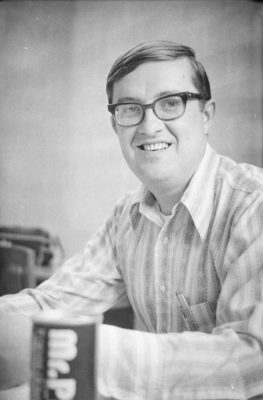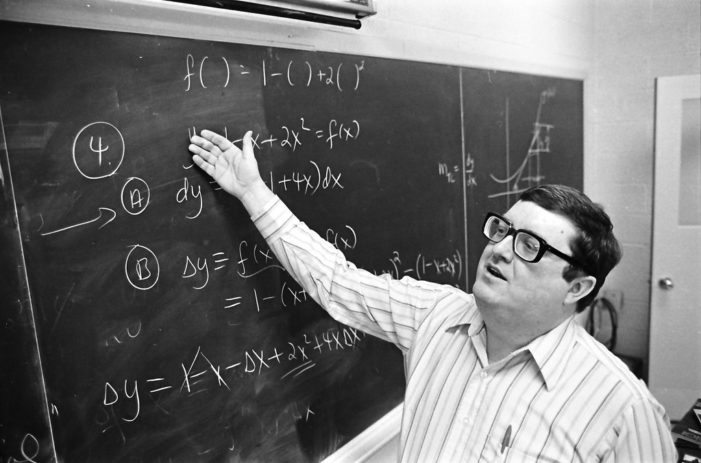Dr. Thomas Nicely, a retired Lynchburg professor who famously discovered a Pentium computer chip error and invented a popular football board game, died Wednesday, September 11, 2019, as a result of injuries sustained in a recent car accident.

A memorial service will be held at 10:30 a.m. Saturday, October 5, in Snidow Chapel at the University of Lynchburg.
Nicely taught mathematics at Lynchburg College, now the University of Lynchburg, for more than 30 years. He had a reputation as an excellent teacher, an avid sports fan, and a master of computer programming and number theory.
“Tom was a real polymath,” said Dr. Julius Sigler ’62, a longtime Lynchburg physics professor and dean. Sigler and Nicely both earned their PhDs at the University of Virginia and came to teach at Lynchburg in the late 1960s.
He remembers a lot of good-natured ribbing about how Nicely had gone from studying physics as an undergraduate to studying applied mathematics to doing number theory research — which Sigler described as “anything but applied. It’s just pure mathematical speculation for the fun of it.”
Sigler said Nicely mastered computer programming easily. “When Tom and I were in graduate school, the computer filled one floor of a brand new building, and it only had 48K memory,” Sigler said. “He grew up intellectually at a time when computers were highly specialized tools and not something you would ever have on your desk. The ease with which he learned to use them was fascinating to watch.
“And I think Tom really enjoyed pushing the limits of the computer.”

In 1994, Nicely was doing number theory research regarding prime numbers. He wrote programs to run his calculations using the combined power of the computers in a campus computer lab. After he discovered an error in some calculations, he investigated the problem and eventually tracked it to a division error in Intel’s widely used Pentium Chip.
This discovery put Nicely in the spotlight for several months, and he gave many interviews about the error and its significance. Intel recalled the affected model of the Pentium processor and eliminated the error.
Sigler said Nicely approached the discovery with simple satisfaction. “I remember the first time he came into the office to tell me about it. He was just as low key as ever,” Sigler said. “He was just happy to have resolved a problem, and he was even happier when Intel acknowledged there was a problem.
“I don’t think it was something that he thought was the crowning achievement of his intellectual life.”
Sigler said Nicely should be remembered for many contributions he made to the field of number theory, as well as his choice to make his programs and papers public domain so other researchers could use them.
“He just really enjoyed being in a classroom. … I think he’d like to be remembered as a really good teacher. A person who worked with students and helped him grow.”
― Dr. Julius Sigler
Nicely also applied his numerical skills to sports. “Tom was one of the great sports fans of all time,” Sigler said.
In the 1970s, Nicely developed a football-themed board game similar to fantasy football. It used charts about statistics on each National Football League team to help recreate the game. The game was first marketed as Sports Illustrated Pro Football, and it later was renamed Paydirt.
“It was a very popular board game where you could sit down with another person and play through an entire NFL season and get basically the same statistics that you would get for that season,” Sigler said.
Nicely also was known for winning many tournaments of table tennis, horse shoes, or pool. But Sigler believes Nicely’s preferred legacy would be in the classroom. Although he retired in 2000, he later returned to the University for a few years to tutor mathematics students and teach.
“He was an extraordinary teacher,” Sigler said. “He was really a gifted teacher of mathematics. It didn’t matter which course he was teaching, he could relate to students. He was always willing to help outside of class. He had a tremendous sense of humor — lots of puns and things of that nature.
“He just really enjoyed being in a classroom. When he retired, I know that’s one of the things that he really missed.
“I think he’d like to be remembered as a really good teacher. A person who worked with students and helped him grow.”
Nicely is survived by his wife, Heidi Koring, who retired from the University of Lynchburg academic achievement center; his niece, Linda Sue Haas; his nephews, Clarence Lee Tabor and Roger Tabor; and a long time friend, Randy Sowell.

